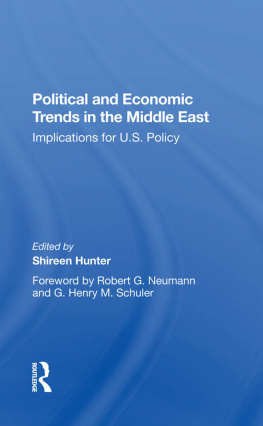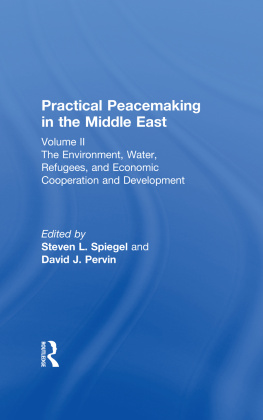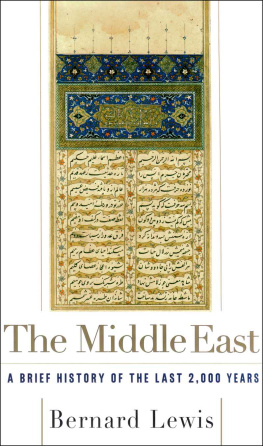The International Library of Sociology
THE ECONOMIC DEVELOPMENT OF THE MIDDLE EAST
Founded by KARL MANNHEIM
The International Library of Sociology
ECONOMICS AND SOCIETY
In 11 Volumes
I | The Danube Basin | Basch |
II | The Economic Development of the Middle East | Bonn |
III | Economics of Migration | Issac |
IV | Economy and Society | Parsons et al |
V | The History of Economics | Stark |
VI | The Ideal Foundations of Economic Thought | Stark |
VII | The Political Element in the Development of Economic Theory | Myrdal |
VIII | Population Theories and the Economic Interpretation | Coontz |
IX | The Social Problems of an Industrial Civilization | Mayo |
X | Studies in Economic Development | Bonn |
XI | Transitional Economic Systems | Douglas |
THE ECONOMIC DEVELOPMENT OF THE MIDDLE EAST
An Outline of Planned Reconstruction
After the War
by
ALFRED BONN
Revised edition first published in England, 1945 by
Routledge, Trench, Trubner & Co., Ltd
Reprinted in 1998, 1999
by Routledge
2 Park Square, Milton Park, Abingdon, Oxon, OX14 4RN
Transferred to Digital Printing 2007
1943 Alfred Bonn
All rights reserved. No part of this book may be reprinted or reproduced or utilized in any form or by any electronic, mechanical, or other means, now known or hereafter invented, including photocopying and recording, or in any information storage or retrieval system, without permission in writing from the publishers.
The publishers have made every effort to contact authors/copyright holders of the works reprinted in The International Library of Sociology.
This has not been possible in every case, however, and we would welcome correspondence from those individuals/companies we have been unable to trace.
British Library Cataloguing in Publication Data
A CIP catalogue record for this book is available from the British Library
The Economic Development of the Middle East
ISBN 0-415-17525-9
Economics and Society: 11 Volumes
ISBN 0-415-17819-3
The International Library of Sociology: 274 Volumes
ISBN 0-415-17838-X
Publishers Note
The publisher has gone to great lengths to ensure the quality of this reprint but points out that some imperfections in the original may be apparent
The Middle East is to an increasing degree becoming part of the international society of nations ; and as such it is being integrated more and more within the framework of modem international economic, social and cultural relations. But it is not so long since the Oriental countries formed a block of their own, bearing the marks of a largely uniform rgime and civilization that had a great many national, political and cultural features in common. This joint heritage is still observable to-day in many fields, although the basic political factors which in former times brought about this unity have meanwhile been seriously disturbed.1
One of the factorsprobably eliminated for good by events since the last warwas the dominant rle of foreigners and foreign capital in the economic and political life of Middle Eastern countries. There were various reasons, on which there is no need to dwell here, for the growing importance of these foreign influences in recent generations. The problems involved in the transformation of Middle Eastern Society and Economics hitherto are comprehensively treated in my book entitled State and Economics in the Middle East, which will appear in the near future.
In recasting the economic life of these regions after the war, it will be impossible to ignore the factors which account for the peculiar development of economic life in the East, and for that distinctive outlook and attitude of the Orient towards economic affairs which has not yet disappeared despite the vast progress seen. It would be a serious mistake if the indiscriminate application of methods, views, measures and the like that have grown up in Western countries were to be recommended for the East as well.
But there is yet another difficulty. In the course of many decades Western countries, large powers as well as small states, have developed comprehensive institutions for the statistical and scientific exploration of almost all aspects and fields of economic and social life. Thus it has become possible to approach problems of planning in the West with measuring rods and instruments that are adapted to their purposes, and to gauge the possibilities and prospects of planned reconstruction with a high degree of probability; for the size of things, their ratio and scope as well as their interrelations, are largely known there. In the East, however, the situation is rather different. Here, it is true, commendable statistical work has already been done, but on a far more limited scale. Thus fundamental types of information, which constitute the backbone of Western statistics, are still lacking in many Oriental countries, with the inevitable result that planning for Oriental regions, with the possible exception of Palestine, can be undertaken only subject to reservations regarding the correctness of those underlying estimates which must be used in lieu of exact data. This fact will have to be borne in mind whenever reconstruction schemes for Eastern and Western countries are compared.
Yet the necessity for preparing material and proposals for reconstruction exists in the East no less than in the West. Hence we must go on working, incomplete and scanty though our data may be, while comforting ourselves with the thought that later on, when a more advanced stage of basic statistical knowledge has been achieved, our results will be improved and amplified.
It is my pleasant duty to thank Dr. Elsa Schchter and Dr. Esther Pines for their valuable help in the preparation of many of the tables contained in this book. I must also express my gratitude to the many friends by whose suggestions and comments I have profited.
Part of and a section of the Appendix on the Agricultural Absorptive Capacity of the Middle East have already appeared in LEgypte Contemporaine and the monthly Palestine and the Middle East respectively, to the editors of which I wish to tender my thanks.
Jerusalem, July 1943.
ALFRED BONN.
1 The term Middle East, as used here, embraces the following Oriental countries : Turkey, Syria and Lebanon, Palestine, Transjordan, Iraq, Egypt, and Cyprus. Iran and the States and dependencies of the Arab Peninsula belong to the same block in a sense, but are not treated in this work as various features common to the other countries are missing.
The Economic Development of the Middle East
Any economic and social reorganization of the territories of the Old and the New Worlds must allow for the inescapable fact that the countries linking the continents of Europe, Asia and Africa function at an exceedingly low social and economic level. As long as communications between the various parts of the world and within the Orient itself could be maintained only by dint of great effort, the marked differences between the standards of living of the population of the various countries were not sufficient to provoke social unrest and discontent. The resignation of the inhabitants, the frugality of their lives and their own ignorance of all that was going on beyond their own particular districts prevented them, so to speak, from realizing their hard lot. This fatalistic attitude has gradually altered. Following the political liberation of the peoples of the East from foreign dominion, their sense of economic welfare and independence has been stirred considerably. The linking of even remote regions and localities with centres of trade and communications and with the capitals of their countries, the development of modern means of transport, the dissemination of modern social ideas, have all combined to inculcate new notions of state and society among the under-privileged classes, who form the bulk of the Oriental population. As a result it is incumbent upon the governments of Oriental states to bring their countries into accord with modern social and economic standards, and to devise ways and means for achieving this end. There can be no doubt that such a policy will assume added importance after the present war ; the slogans freedom from want and social security, pointing to the necessity of far-reaching social reforms, are probably nowhere so justified as in the countries of the East.







